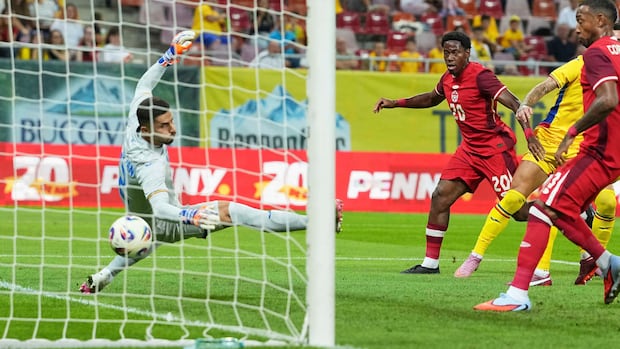Soccer coaches have philosophies. Their players are their means to express them.
When a coach finds a player who subscribes to the same faith, who represents the best of their shared belief system, they will attach to each other with a bond that surpasses loyalty. They become something closer to co-conspirators.
For Jesse Marsch, the head coach of Canada’s men’s soccer team, that player is Ali Ahmed.
“I would argue that Ali understands how we play better than anyone on the entire team, tactically and intellectually,” Marsch said before Friday’s friendly against Australia in Montreal. “I value Ali as a player maybe more than any coach he’s ever had, because he understands exactly what I need from players who play in his spot.”
Ahmed’s spot is on the left side of the pitch, where he’s employed as a high, forward-thinking midfielder — like Tajon Buchanan’s role on the right, if a little more workmanlike.
“Always on goal, always on goal, always on goal,” Ahmed said in an exclusive interview with CBC during his team’s trip to Romania and Wales last month. “I enjoy the style we’re playing. And I feel like I have the athletic ability and endurance required to play that style.”
Marsch favours a relentless, collective press. He has built a team of athletes, fast and physical, and trained them to run at their opposition, forcing rushed decisions and, hopefully, mistakes. Those mistakes lead to turnovers, which lead to chances, which lead to goals.
Andi Petrillo sits down with Canadian men’s national team forward Tajon Buchanan, now starring at Villarreal, to talk life in Spain, his breakout season, and what’s next with Canada.
The risk of a press — because every soccer philosophy has its counter — is exposure at the back. Playing high, and then failing to win possession, can leave defenders outnumbered, susceptible especially to long balls over the top.
Pressing is also exhausting work. Tired players can forget what they’ve been taught, and in a game of fine margins, a lost step might be all the opening a fresher opposition needs.
Ahmed’s gift, in addition to his limitless stamina — “I love to run,” he said — is his understanding of how to press. It’s a style that might look reckless, even maniacal, but there’s method to it. At their best, Marsch’s men press the way wolves or orcas hunt: They organize, with Ahmed often acting as the disciplinarian, as the rigour behind the charge.
Ali makes mistakes like everyone else, but in terms of his pure understanding of what’s necessary at any moment, he’s almost perfect. And he can run for days.- Canadian men’s coach Jesse Marsch
“It looks like we play a risky style, but I think we have the right characteristics to allow us to accept that risk,” Ahmed said. “The speed that we have, our ability to close distance, allows us to save ourselves. I don’t think anybody on this team is thinking about the risk.”
Ahmed is always thinking, though. Some players can’t understand what a coach wants. (They are cut or benched except for an extraordinarily gifted few, whose mental mistakes become an opportunity cost.) Other players know what they should do but lack the physical or technical abilities to do it. (They become coaches.)
The best players are intelligent machines.
“In our sport, that’s special,” Marsch said. “Ali makes mistakes like everyone else, but in terms of his pure understanding of what’s necessary at any moment, he’s almost perfect. And he can run for days.”
It was a 3-0 win for Canada over Romania Friday as Ali Ahmed scored his first career goal for his national side, with Jonathan David and Niko Sigur also adding markers in Bucharest.
Ahmed was rewarded for his near perfection in Canada’s stunning dominance of Romania. Jonathan David tried to thread a pass to him in the box, but the ball bounced to a defender, who passed it back to Horatiu Moldovan, Romania’s keeper.
Ahmed was maybe 10 yards away from him. He pressed but with precision, carefully cutting off two of Moldovan’s better possible outlets. The rest of Canada’s collective press took care of the remainder.
Moldovan, realizing he was without options, panicked and tried to cut back; Ahmed didn’t fall for the feint. He stole the ball and found the net with it, leaving the exposed keeper spitting at the grass in frustration, and Ahmed with his first goal for the national team.
“My first goal, just like that,” he said with a little wonder in his voice. “Maybe that happens one in 20 times.”
And then, as he always does, Ali Ahmed did a little calculus, finding, and providing, reason to believe.
“One in 20 times is enough,” he said.


